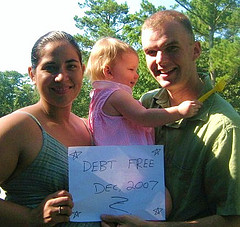Debt Settlement is a viable option for many consumers who are faced with too much debt and are not able to meet the minimum payments required.

I had written a blog recently that addressed the main aspects of debt settlement, but want to answer some more questions most people have when considering their options on how to deal with debt through debt settlement:
WHEN ARE DEBT COLLECTORS CONTACTED?
When a person decides that entering a debt settlement program is their best option, most of the time, he or she has fallen behind in making payments, has started receiving phone calls and possibly some threatening letters demanding that you pay at once...or else!
If you are a debt settlement company tries to contact the original creditor too soon, a good settlement (or a settlement at all) may not be obtained.
As long as your accounts are still with the original creditor (Visa, Master Card, Discover, etc.) and have not been charged, transferred or sold to a debt collector, they have the right to call you about your account.
After about 120 days or so, most creditors will assign your account to a debt collector. When this happens, you will receive letters and calls from the debt collector.
Now you can make a written request for them to stop calling you and according to the Fair Debt Collection Practices Act (FDCPA), then must cease calling. But, they will still continue to send demand letters.
Once the debt collector sees that you are serious and knowledgeable about your debt(s), they may be more willing to negotiate a settlement.
Here's another question you may have...
CAN A DEBT COLLECTOR CONTACT MY FAMILY, FRIENDS OR NEIGHBORS ABOUT MY DEBT?
There's a lot to this answer, but basically and unfortunately, the answer is "yes".
HOWEVER...
A debt collector can only attempt to inquire about your address and possible a contact number. They are prohibited from revealing any information about your debt.
If you feel that your rights under the Fair Debt Collection Practices Act have been violated, you may take legal action against the debt collection company.
CAN A DEBT COLLECTOR CALL YOU AT WORK?
No! If they do, all you have to do is inform (verbally) that you cannot receive calls at your place of employment and they must cease calling immediately. Most collectors will abide by your request, but again, if you feel they haven't or your rights have been violated, you may want to seek legal action.
A debt collector and behalf of the original creditor may decide to seek a judgment against you. If so, they must file a COMPLAINT through an attorney licensed in your state. The complaint is filed at your county courthouse and once it is, a SUMMONS will be issued.
SO, WHAT HAPPENS IF YOU RECEIVE A SUMMONS?
The biggest mistake you can make is to ignore the summons! Most often, the summons will state that you have 20-30 days in order to contest or dispute the claim that you owe the debt. To dispute the claim, you will need to file an "ANSWER" with your court's clerk. This "ANSWER" is a legally document that provides proof of why you do not owe the debt.
If you are 100% positive that the CLAIM or SUMMONS is incorrect, then by all means file the ANSWER. But, understand, that there is a fee for doing this and the court will not look favorably on you if you try to get out of a debt you actually owe!
OK, so you get the summons, know that you owe the debt, now what?
Contact the attorney or debt collector and attempt to negotiate a settlement or a repayment agreement.
Depending on your particular circumstances, you may be able to get a good deal and the summons/legal process will not go forward.
I've written several articles about this and it would be worth your time to out that information!
OK, I'm asked this one all the time:
HOW WILL A DEBT SETTLEMENT PROGRAM AFFECT MY CREDIT SCORE?
Your credit score is determined by several factors, such as:
- Payment history
- Type of credit used
- Amount of credit/debt
- How long you have had a credit rating
- Employment history
- How often you have applied for credit
A great site to learn more about your credit score can be found at MYFICO.
If you are a candidate for a debt settlement program, most likely your credit score has fallen over the last months or years.
I believe that one of the most important factors in determining your credit score is how many and how large are you debt balances!
Once these are settled and show a $0 balance, your credit score will start to improve. We have had numerous clients complete the debt settlement program and have their scores go from say, 585 to 686-725 after all debts were settled!
It is really satisfying to see a client complete the program, become debt free and even qualify for a mortgage!
I hoped this blog has helped answer some of your questions about debt settlement. If we can be of any service, please let us know:







